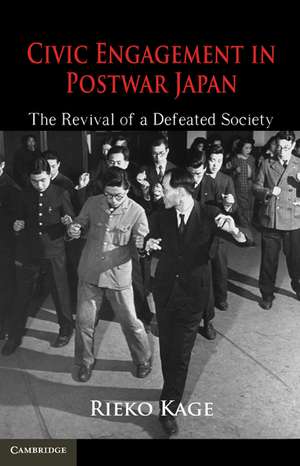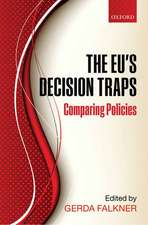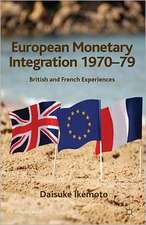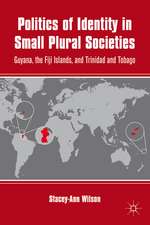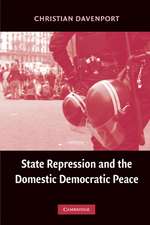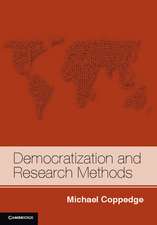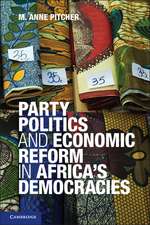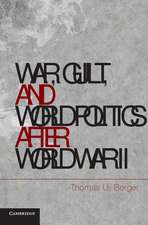Civic Engagement in Postwar Japan: The Revival of a Defeated Society
Autor Rieko Kageen Limba Engleză Hardback – 14 dec 2010
Preț: 691.66 lei
Preț vechi: 777.15 lei
-11% Nou
Puncte Express: 1037
Preț estimativ în valută:
132.39€ • 143.85$ • 111.28£
132.39€ • 143.85$ • 111.28£
Carte tipărită la comandă
Livrare economică 21 aprilie-05 mai
Preluare comenzi: 021 569.72.76
Specificații
ISBN-13: 9780521192576
ISBN-10: 0521192579
Pagini: 216
Ilustrații: 16 b/w illus. 21 tables
Dimensiuni: 156 x 234 x 14 mm
Greutate: 0.45 kg
Editura: Cambridge University Press
Colecția Cambridge University Press
Locul publicării:New York, United States
ISBN-10: 0521192579
Pagini: 216
Ilustrații: 16 b/w illus. 21 tables
Dimensiuni: 156 x 234 x 14 mm
Greutate: 0.45 kg
Editura: Cambridge University Press
Colecția Cambridge University Press
Locul publicării:New York, United States
Cuprins
1. Introduction; 2. Civic engagement: the dependent variable; 3. War and civic engagement: a theoretical framework; 4. Quantitative analysis: the rise of civic engagement across forty-six Japanese prefectures; 5. The long-term effects of wartime mobilization: cross-national analysis; 6. Repression and revival of the YMCA Japan; 7. Wartime promotion and postwar repression of a traditional martial art; 8. Civil society and reconstruction in postwar Japan; 9. Conclusions.
Recenzii
“This is a superb book written with nuance, creativity and as much precision as the subject of civic engagement allows. It has much to teach us about post-war societies and about the crafting of a compelling argument.”
—Nancy Bermeo, University of Oxford
“Civic Engagement in Postwar Japan offers a strikingly original and important analysis of the relationship between wartime mobilization and postwar civic engagement. Kage draws on a rich case study of Japan and a statistical analysis of World War II to demonstrate the powerful and politicizing effect of homefront mobilization on the growth of postwar associational life. A fascinating account, this book will appeal to scholars interested in debates about war’s effect on democracy and the sources of civil engagement.”
—Elizabeth Kier, University of Washington
“This is an important book that anyone interested in civil society or civic engagement in Japan needs to read. Kage’s excellent study will also have broad appeal to comparative scholars of these topics and of Japanese politics in general. Kage explores an empirically and theoretically important question with surpassing diligence, and this pays off with compelling conclusions that challenge the conventional wisdom about Japanese economic development and civil society. With its analysis of the legacies of wartime mobilization, the book will provoke new research about the nature of voluntarism and civic engagement. War destroys, but Kage shows how civic engagement unleashes recovery and rebuilding after wartime devastation. Focusing on the extent of wartime mobilization and the legacies of prewar voluntarism, Kage carefully traces the patterns of postwar civic engagement to provide important general lessons about rebuilding war-torn societies. Kage presents a forceful reinterpretation of the ‘Japanese postwar economic miracle’ that emphasizes the role of civic engagement, and the legacies of wartime mobilization and prewar patterns of voluntarism. A book about revival, after war and in the ashes of destruction, carries special import in the study of a contemporary Japan afflicted by economic malaise and daunting social and political challenges.”
—Robert Pekkanen, University of Washington
“Civic Engagement in Postwar Japan has provocative implications for practice. If Kage is right, legacies of cultural belief and social practice established in the past have more influence on the response to postwar situations than the “shock and awe” that a population may have experienced.” -David C. Hammack, Case Western Reserve University, Nonprofit and Voluntary Sector Quarterly
—Nancy Bermeo, University of Oxford
“Civic Engagement in Postwar Japan offers a strikingly original and important analysis of the relationship between wartime mobilization and postwar civic engagement. Kage draws on a rich case study of Japan and a statistical analysis of World War II to demonstrate the powerful and politicizing effect of homefront mobilization on the growth of postwar associational life. A fascinating account, this book will appeal to scholars interested in debates about war’s effect on democracy and the sources of civil engagement.”
—Elizabeth Kier, University of Washington
“This is an important book that anyone interested in civil society or civic engagement in Japan needs to read. Kage’s excellent study will also have broad appeal to comparative scholars of these topics and of Japanese politics in general. Kage explores an empirically and theoretically important question with surpassing diligence, and this pays off with compelling conclusions that challenge the conventional wisdom about Japanese economic development and civil society. With its analysis of the legacies of wartime mobilization, the book will provoke new research about the nature of voluntarism and civic engagement. War destroys, but Kage shows how civic engagement unleashes recovery and rebuilding after wartime devastation. Focusing on the extent of wartime mobilization and the legacies of prewar voluntarism, Kage carefully traces the patterns of postwar civic engagement to provide important general lessons about rebuilding war-torn societies. Kage presents a forceful reinterpretation of the ‘Japanese postwar economic miracle’ that emphasizes the role of civic engagement, and the legacies of wartime mobilization and prewar patterns of voluntarism. A book about revival, after war and in the ashes of destruction, carries special import in the study of a contemporary Japan afflicted by economic malaise and daunting social and political challenges.”
—Robert Pekkanen, University of Washington
“Civic Engagement in Postwar Japan has provocative implications for practice. If Kage is right, legacies of cultural belief and social practice established in the past have more influence on the response to postwar situations than the “shock and awe” that a population may have experienced.” -David C. Hammack, Case Western Reserve University, Nonprofit and Voluntary Sector Quarterly
Notă biografică
Descriere
This book illuminates one of the keys to making postwar democracies work.
